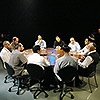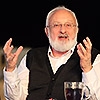 Like A Bundle of Reeds, Why Unity and Mutual Guarantee Are Today’s Call of the Hour, Michael Laitman, Ph.D.
Like A Bundle of Reeds, Why Unity and Mutual Guarantee Are Today’s Call of the Hour, Michael Laitman, Ph.D.
Chapter 6: Expendable
Contemporary Anti-Semitism
The Writing on the Wall
And yet, by the onset of the 20th century, the Jews had grown so far from their intended vocation that, by and large, they became either utterly preoccupied with meticulous observation of the practical commandments, forgetting or rejecting their internal meaning, or fully absorbed in worldly, material desires, forgetting or rejecting their irrevocable vocation. At a time when egotism spiked to levels that threatened world peace, neither avenue was desirable, and some of the nation’s great spiritual leaders began to warn that time was of the essence, that we had to wake up to our mission and carry it out before calamity unfolded.
The great scholar humanist, and Kabbalist, Rav Avraham Yitzhak HaCohen Kook, desperately tried to alert the Jews to the growing anti-Semitism. He warned them that no country would be safe for them, and that Israel was the only secure option. In retrospect, the content of his premonition is alarming, giving us a glimpse into the depth of such people’s clarity of vision.
The treatise in which he entreated with the Jews to come to Israel was called, “The Great Call for the Land of Israel.” Note not only his plea, but also his warning regarding the Jews’ possible future in their homelands: “Come to the land of Israel, delightful brothers, come to the land of Israel. Save your souls, the souls of your generations, and the soul of our entire nation. Save it from desolation and oblivion; save it from decay and degradation; save it from all the uncleanness and wickedness, from every trouble and plight that might befall it in all the countries of the nations without exception.
“‘Come to the land of Israel!’ We shall call out with a loud and terrible voice, with the sound of thunder and a great voice, a voice that stirs storm and quakes the heaven and the earth, a voice that tears every wall in the heart. Run for your lives and come to the land of Israel. The voice of the Lord is calling us, His hand is stretched out to us, His spirit is in our hearts, and He assembles us, encourages us, and compels us all to call out loud with a terrible and mighty voice: ‘Our brothers, children of Israel, dear beloved brothers, come to the land of Israel. Assemble one by one, wait not for formal words and orders; wait not for permits from renowned ones. Do what you can, flee and gather, come to the land of Israel. Pave the way for our beloved and oppressed nation. Show it that its way is paved already, stretched out before it. It must not rest; it has nothing to demand; it has not many ways and routes. There is one way before it, and this is the one it shall march; it is the one it must march, specifically to the land of Israel.’”[i]
The Rav Kook was not alone in his concern. In Poland, a brilliant young dayan (Orthodox judge) in Warsaw—at the time the biggest and most prominent Jewish community in Europe—Rav Yehuda Ashlag, who later became a renowned commentator on The Book of Zohar, did not settle for publicly announcing that all Jews must flee Europe. He arranged for the purchase of 300 wooden shacks from Sweden and a place for them to be erected in the Land of Israel (which was then called “Palestine”).
Alas, his plan was thwarted by opposition from leaders of the Jewish congregation in Poland. The tragic consequence of Ashlag’s failure to bring his fellow Jews with him was that of all the Jews who contemplated coming with Ashlag, only Ashlag and his family eventually emigrated. The rest of the families remained in Poland and perished in the Holocaust.[ii]
Both the Rav Kook and Rav Ashlag (Baal HaSulam) expressed how they perceived the rise of Nazism to power, and specifically Hitler. Keep in mind that Rav Kook died in 1935, four years before World War II even broke out. Below are Rav Kook’s edited words (to make them more reader friendly, due to the length of the text and its antiquated style), followed by the words of Baal HaSulam.
The prophet predicted a great Shofar of redemption. [A Shofar is a ram’s horn used for festive blowing, but it also represents a clarion.] We pray specifically for the blowing of a great Shofar. There are several degrees in a Shofar of redemption—a great Shofar, a medium Shofar, and a small Shofar. The Shofar of the Messiah is considered the Shofar of Rosh Hashanah [Hebrew New Year’s Eve]. The Halachah [Jewish law] distinguishes between three degrees in the Shofar of Rosh Hashanah: 1) A Shofar of Rosh Hashanah that is made of a ram’s horn; 2) In retrospect, all Shofars are kosher; 3) A Shofar from an impure beast, as well as a Shofar from beasts of idol-worship of a non-kosher gentile. However, if one has blown such a Shofar, one has done one’s duty.
It is permitted to blow any Shofar, kosher or not, as long as one does not bless over it, and the degrees explained in the law of the Shofar of Rosh Hashanah coincide with the degrees of the Shofar of redemption.
Yet, what is a Shofar of redemption? By the term, “Messiah’s Shofar,” we refer to the awakening and thrust that causes the revival and redemption of the people of Israel. It is this awakening that assembles the lost and the rejected, and brings them to the mountain of holiness in Jerusalem.
Throughout the generations, there have been those in Israel who felt the awakening that stems from the desire to do God’s will, which is Israel’s complete redemption [bringing all of Israel to the quality of bestowal]. This is the fine and great Shofar, the people’s desire to be redeemed.
Sometimes the desire dwindles and the zeal for sublime notions of holiness is not as fervent. However, the healthy human nature remains, and sets off a simple desire in the nation to establish its rule in its land. That natural desire is the ordinary, medium Shofar, which is present everywhere. That, too, is still a kosher Shofar.
However, there is a third degree to the Shofar of the Messiah, which is nonetheless comparable to the Rosh Hashanah Shofar: it is the small, non-kosher Shofar, which is blown only if a kosher Shofar cannot be found.
Thus, if the zeal for holiness and yearning for redemption that derives from it have all but vanished, and if the natural national desire for a national life has diminished, too, and no kosher Shofar is found by which to blow, the enemies of Israel come and blow into our ears for our redemption. They force us to heed the Shofar’s voice; they warn and rattle in our ears, and give us no rest in exile.
[This part is quoted in full.] “Thus, the Shofar of a foul beast becomes the Messiah’s Shofar. Amalek, Petlura [anti-Semitic Ukrainian leader], Hitler, and so forth, awaken for redemption. One who did not hear the voice of the first Shofar, or the voice of the second … for his ears were blocked, will hear the voice of the impure Shofar, the foul [non-kosher] one. He will hear against his will. …While there is redemption in that whip, as well, in the plight of the Jews, one must not bless over such a Shofar.[iii]
Baal HaSulam, too, made several references to Nazism, including how he believed it could be overturned. In his words, “It is impossible to bring down Nazism unless by a religion of altruism.”[iv] Note that when Baal HaSulam speaks of “religion of altruism,” he does not mean that we should perform certain rituals or observe particular conducts. Rather, by “religion of altruism” he means that one has changed one’s nature into that of altruism. At the same time, people will choose whether or not to stay in their formal denominations, regardless of this transformation.
Baal HaSulam also disputes the notion that Nazi Germany was a once-in-history event. It may have been the first, but he believed that unless we do what we must, it will not be the last. In his words, “It turns out that people mistakenly think that Nazism is only an offshoot of Germany … all the nations are equal in that, and it is utterly futile to hope that the Nazis will perish with the victory of The Allies, for tomorrow the Anglo-Saxons will embrace Nazism…”[v]
In light of the spike in anti-Semitism worldwide, it would be wise to seriously consider the words of these wise men. After all, we can evidently see that anti-Semitism has not vanished, nor has Nazism or the call to do away with the Jews.
[i] Rav Yitzhak HaCohen Kook (the Raiah), Essays of the Raaiah, vol. 2, “The Great Call for the Land of Israel,” 323.
[ii] Aaron Soresky, “The ADMOR, Rabbi Yehuda Leib Ashlag ZATZUKAL—Baal HaSulam: 30th Anniversary of His Departure,” Hamodia, 9, Tishrey, TASHMAV (September 24, 1985).
[iii] Rav Avraham Yitzchak HaCohen Kook (Raaiah), Essays of the Raaiah, vol. 1, pp 268-269.
[iv] Rav Yehuda Leib HaLevi Ashlag (Baal HaSulam), The Writings of Baal HaSulam, “The Writings of the Last Generation” (Ashlag Research Institute, Israel, 2009), 853.
[v] Rav Yehuda Leib HaLevi Ashlag (Baal HaSulam), The Writings of Baal HaSulam, “The Writings of the Last Generation” (Ashlag Research Institute, Israel, 2009), 841.
Filed under: Anti-Semitism, Books - No Comments →
 The Torah, “Leviticus,” 23:24 – 23:25: …In the seventh month, on the first of the month, it shall be a Sabbath for you, a remembrance of [Israel through] the shofar blast a holy occasion. You shall not perform any work of labor, and you shall offer up a fire offering to the Lord.
The Torah, “Leviticus,” 23:24 – 23:25: …In the seventh month, on the first of the month, it shall be a Sabbath for you, a remembrance of [Israel through] the shofar blast a holy occasion. You shall not perform any work of labor, and you shall offer up a fire offering to the Lord.










